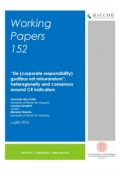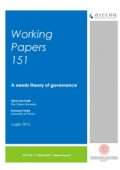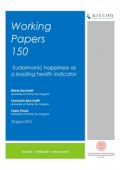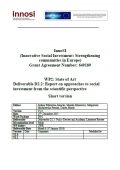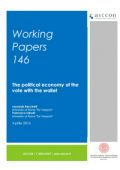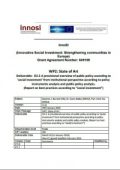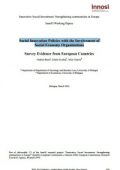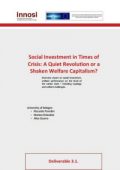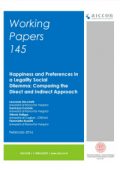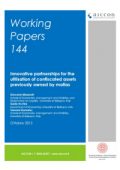31 July 2016
Working Paper
Abstract We investigate with an ad hoc survey respondents’ tastes about the different corporate responsibility (CR) items typically used by CR rating agencies. The hypotheses of […] Read More
25 July 2016
Working Paper
Abstract New-institutional economics hypothesizes imperfect rationality, self-seeking preferences, monetary-related needs, and opportunism as fundamental features of human behavior. Consistently, new-institutionalist models of governance highlight the efficiency […] Read More
9 June 2016
Working Paper
Abstract Eudaimonic happiness (measured in terms of sense of life) is a relatively unexplored subjective wellbeing indicator. The empirical findings presented in this paper show that […] Read More
4 May 2016
Other Texts
This report presents the current state of research and scientific debate on the ‘Social Investment’ policy paradigm in European countries. An extensive review of literature and […] Read More
6 April 2016
Working Paper
Abstract The willingness to pay of private consumers for socially and environmentally re- sponsible companies retailing public goods is an emerging though under-researched contemporary economic feature. […] Read More
4 April 2016
Other Texts
This report is a snapshot of the state of play in 2015 of the ways in which welfare states are moving towards social investment approaches and […] Read More
4 April 2016
Other Texts
In this paper, we investigate significant social innovation policies (related to the concept of social investment) involving the role of Social Economy organizations, and we discuss […] Read More
4 March 2016
Other Texts
This report analyses and seeks to establish whether and how, in the last twenty years, the EU member countries have adopted welfare systems that incorporate aspects […] Read More
11 February 2016
Working Paper
ABSTRACT We investigate players’ preferences in a multiplayer prisoner’s dilemma by comparing results from a direct (satisfaction based) and an indirect (choice based) approach. Both approaches […] Read More
14 October 2015
Working Paper
ABSTRACT Purpose The third sector is a producer of trust and positive social interactions, the mafias destroy trust and social norms. To confiscate assets and the […] Read More
Category
Author
- Acar Berkan
- Albanese Maria
- Amodio Francesco
- Antoci Angelo
- Bachelet Maria
- Bailey Gavin
- Bandini Federica
- Barigozzi Francesca
- Barnett Stephen J.
- Bassi Andrea
- Becchetti Leonardo
- Bellucci Davide
- Bernardi Andrea
- Biancotti Claudia
- Bobbio Emanuele
- Borghesi Simone
- Burani Nadia
- Burdìn Gabriel
- Cacciapaglia Maristella
- Caiazza Stefano
- Cainelli Giulio
- Calidoni-Lundberg Federica
- Caroli Massimo
- Casari Marco
- Caselli Guido
- Castriota Stefano
- Ciampoli Nicola
- Ciciretti Rocco
- Colcerasa Francesco
- Colombo Laura
- Conti Valentina
- Conzo Gianluigi
- Conzo Pierluigi
- Copitch Gary
- Cordella Mauro
- Corrado Germana
- Corrado Luisa
- Costa Michele
- Costantino Marco
- Coviello Decio
- D’Alessio Giovanni
- Delbono Flavio
- DeMaria Federica
- Dorota Moron
- Dragone Davide
- Ecchia Giulio
- Fabbri Marco
- Faillo Marco
- Fedele Alessandro
- Ferrari Massimo
- Fiaschetti Maurizio
- Fiorillo Damiano
- Fox Chris
- Franco Chiara
- Giallonardo Luisa
- Grieco Daniela
- Guerra Alice
- Harttgen Kenneth
- Jalonen Harri
- Komatsu Tamami
- Kopinska Joanna
- Lanzi Diego
- ldona Wiktorska-Swiecka
- Lehti Mira
- Linguiti Francesco
- Lomuscio Marco
- Lubian Diego
- Malgorzata Michalewska-Pawlak
- Mancinelli Susanna
- Mancini sara
- Mancinone Kristian
- Manfredonia Stefano
- Marano Maurizio
- Matthias Freise
- Maurizio Fiaschetti
- Mazzanti Giovanni Maria
- Mazzanti Massimiliano
- Micotti Marco
- Migheli Matteo
- Miniaci Raffaele
- Monika Klimowicz
- Morone Piergiuseppe
- Navarra Cecilia
- Opfinger Matthias
- Orlandini Matteo
- Patuzzo Michela
- Pelligra Vittorio
- Pelloni Alessandra
- Perra Giorgia
- Pisani Fabio
- Prandini Riccardo
- Raffaele Luca
- Raggi Davide
- Rago Sara
- Reggiani Carlo
- Ricca Elena Giachin
- Rossetti Fiammetta
- Rullani Francesco
- Russu Paolo
- Sabatini Fabio
- Sacchetti Silvia
- Sacco Pier Luigi
- Salustri Francesco
- Scaramozzino Pasquale
- Semplici Lorenzo
- Sodini Mauro
- Solferino Nazaria
- Solferino Viviana
- Staffero Gianandrea
- Tedeschi Piero
- Tessitore Maria Elisabetta
- Tonteri Anna
- Tortia Ermanno
- Travaglini Claudio
- Tridente Michele
- Trowbridge Hayley
- Van Der Ploeg Tymen
- Vanin Paolo
- Venturi Paolo
- Vercelli Alessandro
- Vidal Isabel
- Zamagni Stefano
- Zandonai Flaviano
- Zarri Luca
Research topics
- Accountability
- Co-operation
- Finanza Sociale
- Social Economy
- Social Enterprise
- Social Entrepreneurship and Social Innovation
- Social Impact
- Third sector and Civil Society
- Third sector and co-operative enterprise Law
- Welfare and Social Policies

